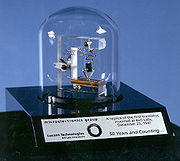
I think synthetic biology will always need customized parts or modules, even if those parts follow certain general design principles. But there are standardized systems that biologists should develop: standardized biochemical lathes for making custom parts. A biochemical lathe works like this: start with a basic scaffold (either an individual protein, or a simple genetic system) and use directed evolution (mutagenize your protein or system, and select better functioning versions) to transform that scaffold into the custom part you want.
So if a biologist comes along and says, "I want a receptor that binds TNT molecules and activates a MAPK pathway in response", you can take your generic MAPK-pathway-activating receptor and use directed evolution to create a receptor that binds TNT. A group at Duke University led by Homme Hellinga basically did this several years ago, but the key is to make a robust, user-friendly, versatile scaffold system. Once you build the system, it should be easy to make all sorts of custom parts.
Directed evolution is a powerful tool in the synthetic biology toolkit. Instead of one-size-fits-all parts that probably won't work in many contexts, let's have standardized part-making kits.



Comments